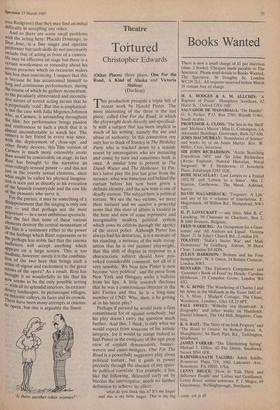Theatre
Toi-tured
Christopher Edwards
(Other Places: three plays, One For the Road, A Kind of Alaska and Victoria Station) (Duchess) rrhis production presents a triple bill of 1 recent work by Harold Pinter. The most interesting of the three is the last piece, called One For the Road, in which the playwright deals directly and specifical- ly with a subject that has been implicit in much of his writing, namely the use and abuse of authority. In this connection one only has to think of Stanley in The Birthday Party who is tracked down to a seaside resort by interrogators who are menacing and comic by turn and sometimes both at once. A similar tone is present in The Dumb Waiter and The Hothouse. In Pin- ter's latest play the jest has gone from the menace; what was nameless and behind the curtain before has now been given a definite identity, and the new tone is one of deadly earnest. The subject here is political torture. We see the two victims, we meet their torturer and we receive a powerful sense that this state of affairs is located in the here and now of some repressive and recognisably modern political system which cows its citizens through the agency of the secret police. Although Pinter has always had his detractors, it is a measure of his standing, a measure of the wide recog- nition that he is our premier playwright, that this shift of degree in response to a characteristic subject should have pro- voked considerable comment, not all of it very sensible. We hear how Pinter is now become 'very political', and the press from New York and Hungary seeks a bulletin from his lips. A little research discloses that he was a conscientious objector in the late Forties and that he is a long-time member of CND. Who, then, is he getting at in his latest play? Perhaps if pressed he would state a firm commitment for or against somebody, but his play doesn't carry the question much further. And this, I think, is only what we would expect from someone of his artistic integrity, for it would be stange indeed to find Pinter in the company of the agit-prop crew of explicit denunciators, banner- wavers and cause-mongers. One For The Road is a powerfully suggestive play about political torture, but it gains in power
precisely through the absence of any speci- fic political correlate. For example, a line like the following, delivered early on by Nicolas the interrogator, needs no further definition to achieve its effect:
. . . what do you think this is? It's my finger and this is my little finger. This is my big
finger and this is my little finger. I wave my big finger in front of your eyes. Like this . . I can do absolutely anything I like . . .
The lights go up on a large high-ceilinged chamber with marble-framed doorways and a large window. The impression is of a grand old building from an earlier civilised political era given over, as we soon learn, to house the headquarters of the secret police. Nicolas (Colin Blakeley) calls in Victor, who enters stumbling, bruised and ragged. The image which this called to my mind was the final scene of The Dumb Waiter where the character Gus has obviously been done over by some unseen hand upstairs and is delivered up for execution. But here this is the image Pinter starts the play with, and this contrast does, perhaps, catch the shift in his attitude. He has, as it were, taken us upstairs to meet the mad masters who oppress his charac- ters. What follows, in One For The Road, is simply a series of interrogations in which Nicolas toys chillingly with his victims in • between pouring himself a succession of whiskies. Various values are invoked by him, with demented righteousness, to jus- tify his punishments — patriotism, the call of a common heritage, but the supposed offence is, of course never particularised. Later we meet Victor's wife Gila who has, it appears, been repeatedly raped by Nico- las's men. We also meet their young son Nicky whose fate, and with it the shuttered future of the police state's citizens, is punningly disclosed in the last line of the play. It is a disturbing and brilliantly controlled little masterpiece of a play.
The other two pieces on the bill are A Kind of Alaska, and Victoria Station. Both feature Colin Blakeley. The latter is a familiar early Pinter type of sketch about a cab driver and his radio controller. The former is a one-act play dramatising the awakening from a 29-year sleep of De- borah (played by Dorothy Tutin). The piece is based upon the true story of the remarkable drug L-Dopa whose effect was, exactly, to bring back to life patients who had suffered from sleeping sickness for many years. The two works are well played but both were seen within the last eighteen 'That's a job that should have gone to a parrot!' months at the National Theatre where I actually found the sketch much funnier and the play more possessed as a sense of a consciousness coming confusedly to grips with a changed world.















































 Previous page
Previous page